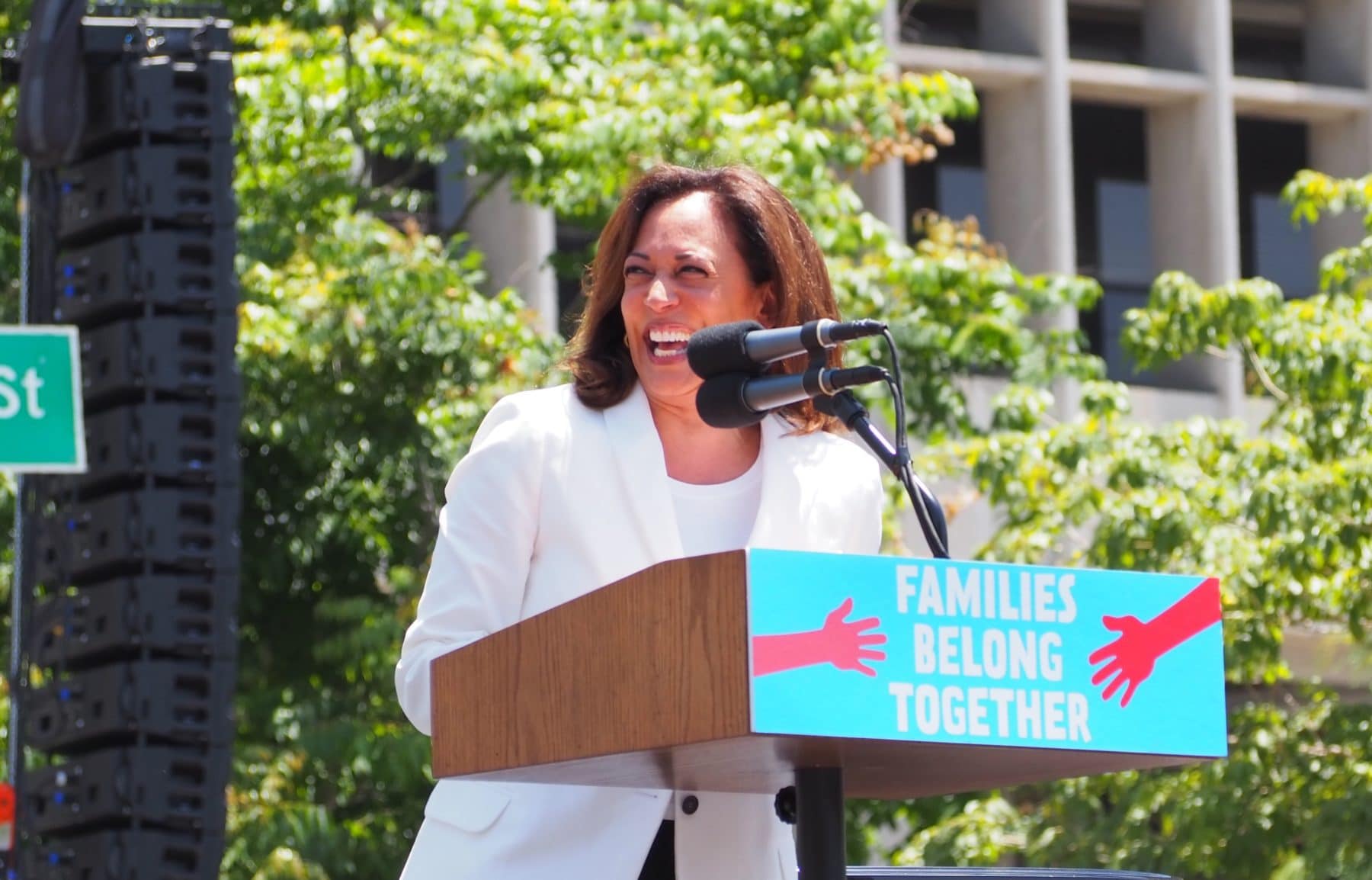On July 22, Senator Kamala Harris, the betting markets’ favorite to become the 2020 Democratic presidential nominee, introduced federal marijuana reform legislation into the Senate, demonstrating that her drug policy approach has moved past laughing at the possibility of cannabis decriminalization.
Reflecting her journey from being California’s top cop to one of the more outspoken 2020 hopefuls on criminal justice reform, Harris’s new legislation also suggests that she is delivering on her denouncement of draconian deportation policies—even though she was complicit in their enforcement as San Francisco’s district attorney. (Harris has sponsored a number of bills aimed at holding border patrol officers accountable and reuniting separated migrant families, and is campaigning on the reinstatement and expansion of the Obama-era Deferred Action for Childhood Arrivals program.)
The Marijuana Opportunity Reinvestment and Expungement Act (MORE Act), which Representative Jerry Nadler (D-NY) plans to introduce to the House, would remove cannabis from the Drug Enforcement Administration’s Schedule I of controlled substances. This, in effect, would recognize its medical purposes while also allowing for its legalization. The bill would additionally direct funds to develop programs to assist with criminal record expungement and re-entry, as well as promotion of cannabis industry participation among people targeted by the drug war—above all low-income communities and people of color.
“As marijuana becomes legal across the country, we must make sure everyone—especially communities of color that have been disproportionately impacted by the war on drugs—has a real opportunity to participate in this growing industry,” said Harris.
And that includes undocumented immigrants. Currently, their immigration status is jeopardized by working in the cannabis industry—from cannabis farms to dispensaries—in states with a legal market.
Earlier this year, a day before weed holiday 4/20, the United States Citizenship and Immigration Services (USCIS) published a policy guidance clarifying that the “good moral character” required for noncitizens’ naturalization is violated by “certain marijuana related activities,” including cannabis industry employment that occurs in jurisdictions “where the conduct would not be a violation of state law.” The guidance came after two Coloradans were denied naturalization because of their participation in the state’s cannabis industry.
To be clear, “Everyone in the country [involved with] marijuana is committing a federal crime, citizen or noncitizen, regardless of state legalization,” said Kathy Brady, a senior staff attorney at the Immigration Legal Resource Center. But the House of Representatives has prevented the Department of Justice from prosecuting citizens’ use of marijuana in legalized states. Immigration status remains unprotected because marijuana continues to be prohibited on the federal level, which arbitrates immigration.
“We are talking about people who did not think they were committing a crime,” said Brady. “If you are a noncitizen—like if you have a green card, or you are undocumented, or you have refugee status—and you live in California where marijuana is completely legal, and if you were to tell an immigration agent that you used medical marijuana under the care of a doctor, the person can find you inadmissible, and that you don’t get to naturalize as a citizen. And in some cases they can deport you.”
Harris’s bill would confront the unique disadvantages faced by noncitizens when it comes to marijuana. The text states that noncitizens cannot be denied “any benefit or protection under the immigration laws” due to “conduct, a finding, an admission, addiction or abuse, an arrest, a juvenile adjudication, or a conviction, relating to cannabis”—both before and after the Act’s potential passage.
Other Democratic candidates’ proposed marijuana legalization bills—like Sen. Corey Booker’s Marijuana Justice Act and Sen. Bernie Sanders‘ 2015 bill, the first-ever to propose ending federal prohibition—would also allow noncitizens to safely participate in the industry. (Sen. Elizabeth Warren’s STATES Act, on the other hand, would not do so, since it would fail to deschedule cannabis.)
Setting itself apart from its competitors, the bill supported by immigrant justice groups like Immigrant Legal Resource Center and UndocuBlack Network would direct 20 percent of revenue from a new five percent marijuana product tax towards the creation of programs that support small cannabis businesses owned by “socially and economically disadvantaged individuals” and reduce barriers to cannabis licensing and industry employment for those most impacted by the War on Drugs.
It’s unclear how many noncitizens currently work in the cannabis industry, let alone the number of people of color and socioeconomically disadvantaged people. The MORE Act could potentially change this by requiring the Bureau of Labor Statistics to collect demographic data on industry employees, and in particular, their “nativity,” or birth place, which is particularly relevant to immigration issues.
While some critics, like Carl Davis, the research director of the Institute on Taxation and Economic Policy, argue that Harris’s bill would just be a tax-cut for Big Marijuana, the MORE Act would begin to pave the way for more undocumented people to participate in an industry from which they have been unequally excluded.
“In Colorado, the cannabis market is legal and legitimate, employing thousands of employees and bringing in nearly $6 billion annually in sales,” said Rep. Joe Neguse of Colorado earlier this year. “It’s time that we end the conflict between state and federal laws to ensure that individuals working in the cannabis industry are not penalized for that work.”
Photograph of Senator Kamala Harris speaking at the 2018 Families Belong Together March in Los Angeles; by Luke Harold





Show Comments